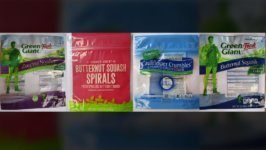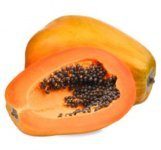The FDA, the CDC and State partners, is investigating a suspected link between pig ear treats and human cases of salmonellosis. CDC reports that there have been 45 cases of human infection with Salmonella enterica serotype I 4,[5],12:i:- in 13 states. Twelve people have been hospitalized. Pig ear treat samples collected from bulk bins in retail locations by the Michigan Department of Agriculture and Rural Development (MDARD) tested positive for several strains of Salmonella (Salmonella London, Salmonella Typhimurium, Salmonella Newport, and Salmonella Infantis), but not the specific strain connected to this outbreak. FDA is also working to remove these pig ears from the marketplace and identify other places where they may have been distributed. @ https://www.fda.gov/animal-veterinary/news-events/fda-investigates-contaminated-pig-ear-pet-treats-connected-human-salmonella-infections?utm_campaign=7-3-2019-PigEars&utm_medium=email&utm_source=Eloqua
ruth
FDA is coordinating with CDC and state agencies to investigate human cases of Salmonella with a suspected link to exposure to pig ear pet treats.
ruth
According to the CDC, there were nearly 3,000 reported cases of cyclosporiasis in 2018. In 2018, an outbreak tied to salads sold in a quick-service restaurant chain made more than 500 people sick in 15 states, and another associated with prepackaged vegetable trays made 250 people ill in four states. Reported cases increase during May-July. So far in 2019, 23 cases of domestically acquired cyclosporiasis have been reported. In early June, representatives of the FDA, CDC, industry, and academia participated in a scientific workshop to discuss gaps in detection methods and plans for the development of tools that will help keep this parasite out of pre- and post-harvest foods. CDC is working to make reporting easier by improving and expanding web-based reporting. The FDA and CDC are improving how they share information with each other, to help facilitate rapid identification and investigation of cyclosporiasis clusters. Last year, the FDA began using a new method, developed and validated by FDA scientists, to detect Cyclospora in food. Another method was developed for water.@ https://www.fda.gov/news-events/fda-voices-perspectives-fda-leadership-and-experts/fda-cdc-develop-robust-strategy-prevent-illnesses-caused-cyclospora?utm_campaign=FDA%20Voices%20Cyclospora&utm_medium=email&utm_source=Eloqua
FDA, CDC join forces during Cyclospora season to prepare for the potential need to rapidly address intestinal illnesses and prevent a cyclosporiasis outbreak.
ruth
The FDA announced on their website that Growers Express issued a voluntary recall of select fresh vegetable products due to potential contamination with Listeria monocytogenes. The fresh vegetable products include packaged varieties of butternut squash, cauliflower, zucchini, and butternut squashed based veggie bowl. The products originate from a Growers Express production facility in Biddeford, Maine. There are no reported illnesses. Tom Byrne, President of Growers Express said “We stopped production immediately after being notified of a single positive sample by the Massachusetts Department of Health. We are deep sanitizing the entire facility and our line equipment, as well as conducting continued testing on top of our usual battery of sanitation and quality and safety tests before resuming production.” Labels affected include Green Giant Fresh, Growers Express, Signature Farms, and Trader Joe’s. a full list of products and their distribution is available on the FDA website @ https://www.fda.gov/safety/recalls-market-withdrawals-safety-alerts/growers-express-issues-voluntary-recall-multiple-fresh-vegetable-products-due-potential?utm_campaign=Growers%20Express%20Issues%20Voluntary%20Recall%20of%20Multiple%20Fresh%20Vegetable%20Products&utm_medium=email&utm_source=Eloqua
https://www.fda.gov/safety/recalls-market-withdrawals-safety-alerts/growers-express-issues-voluntary-recall-multiple-fresh-vegetable-products-due-potential?utm_campaign=Growers%20Express%20Issues%20Voluntary%20Recall%20of%20Multiple%20Fresh%20Vegetable%20Products&utm_medium=email&utm_source=Eloqua
ruth
An outbreak of 62 Salmonella Uganda illnesses potentially linked to whole, fresh papayas imported from Mexico is being investigated by the U.S. FDA (https://www.fda.gov/food/outbreaks-foodborne-illness/outbreak-investigation-salmonella-uganda-potentially-linked-whole-fresh-papayas-june-2019?utm_campaign=Outbreak%3A%20Salmonella%20Whole%2C%20Fresh%20Papayas_06282019&utm_medium=email&utm_source=Eloqua), along with the CDC (https://www.cdc.gov/salmonella/uganda-06-19/index.html), and state and local partners. These illnesses have been reported in eight states (Connecticut, Massachusetts, New York, New Jersey, Pennsylvania, Rhode Island, Florida, and Texas) and 23 people were hospitalized. The preliminary data generated indicates that whole, fresh papayas from Mexico are the source of this outbreak. There are no recalled products at this time. In 2017, at least 251 people across 25 states were sickened from papayas imported from Mexico. Maradol Papayas was indicated as the source of four outbreaks involving eight strains of Salmonella. These included Salmonella Urbana, Salmonella Newport, Salmonella Infantis, Salmonella Anatum, Salmonella Thompson, Salmonella Kiambu, Salmonella Agona and Salmonella Gaminara.
Consumers in six states warned to avoid whole, fresh papayas from Mexico



